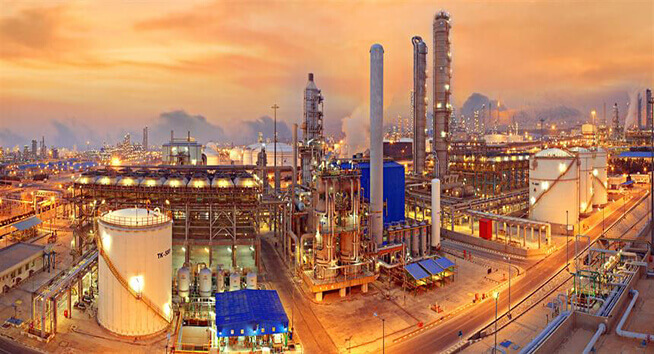Petrochemical Industry Products
The petrochemical industry is a subset of the chemical industry that produces chemical products from raw materials derived from oil and gas. There are some chemical compounds that are made from other fossil fuels such as coal or from renewable sources such as corn, sugarcane, or date fruit.
In a general definition, petrochemicals are part of chemical products that are produced by deformation and through an interaction of oil or natural gas hydrocarbons with other materials.
The word petrochemical is made up of the two words petroleum and chemistry, which means chemicals made from oil.
Petrochemical Products:
Petrochemical products are an important part of the chemical and polymer industries because the demand for plastic and synthetic materials is constantly growing and on the other hand they have a major share in the economy and society today. These products are used to produce thousands of different products that people use daily.
Petrochemical products are very diverse and in a wide range of products, from food to basic chemicals, chemical intermediates (derivatives), and finally final products such as plastics, rubber, resins, synthetic fibers, adhesives, paints, detergents, Pesticides are included.
In the petrochemical industry, the most abundant organic chemicals produced are methanol, ethylene, propylene, butadiene, benzene, toluene, and xylene.
Types of Petrochemical Products:
Petrochemical products are generally divided into 3 categories:
Basic product (feeds): Feeds are crude hydrocarbons obtained from the refining of crude oil by distillation and thermal and catalytic processes. Such as ethylene, propylene, sulfur, gasoline, ammonia, etc., which are the main materials for the production of intermediate materials.
Light and heavy naphtha and kerosene (liquid feed), natural gas and liquefied petroleum gas (LPG), methane, ethane, butane, propane, pentane, nitrogen, sulfur, and phosphate soils are the main feedstocks for petrochemical complexes.
Intermediate products: This category converts basic products into feed required for the production of final products, such as PVC, ethylene glycol, melamine, etc.
The final products: These types of products are used to make tools and equipment used by industry and the general public; Such as synthetic fibers, rubber, plastic devices, chemical fertilizers, and medical devices.
Petrochemical Complementary Industries Category:
1_ Plastic
2_ Rubber
3_ paint and resin
4_ Combined fertilizers and toxins
5_ Chemicals and solvents
6- Fiber and textile
7- Cosmetics
8_ Composite
9_ Chemical drugs

Review of Some Important Products in the Petrochemical Industry:
Methane: It is a type of greenhouse gas that can be used as fuel.
Benzene: This material is used in the production and manufacture of medicines, furniture, electronic devices, and food packaging.
Methanol: It is useful in thermal insulation and building materials.
Butadiene: This compound plays an essential role in the manufacture of synthetic rubber.
Ethylene: Used in the manufacture of plastics, various detergents, synthetic lubricants, and styrenes.
Application of Petrochemical Products:
The many things we deal with every day, the clothes we wear, the building materials used to build our homes and offices, the variety of home appliances and electronics, the packaging of food and beverages, and many products used in transportation are produced from chemicals and plastics, the vast majority of which can be produced by the petrochemical industry.
Medical:
Petrochemical products play an important role in medicine; Because they are used to make resins, films, and plastics. Here are just a few examples
Phenol and Cumene are used to make penicillin (a very important antibiotic) and aspirin.
Petrochemical resins are used to refine and manufacture drugs, thus reducing costs and speeding up the production process.
Plastics and resins are used to make devices such as prostheses and skins.
Plastics are used to make a wide range of medical devices, including bottles, disposable syringes, and more.
Drugs such as acetylsalicylic acid (pain reliever), antihistamines, antibacterials, breast syrups, lubricants, etc. are all made from petrochemicals. Resins are also used in the production and purification of drugs.

Food:
Petrochemicals are used to make food preservatives that keep food in fresh packaging or cans. In addition, petrochemicals can be used in the production of many chocolates and candies. Food dyes made by the petrochemical sector are used in countless products, including chips, packaged foods, and canned foods.
Cosmetics:
Cosmetic products are now widely used in various communities, although in recent years efforts have been made to replace natural compounds with the chemicals used in them, many of the petrochemicals used in them are still nonexistent. They are replaceable. Some of the ingredients used in cosmetics are phenol oxyethanol, waxes, etc.
Automotive industry:
Today, the production of lighter and more durable cars has become one of the priorities of manufacturers. Polymers and copolymers, a large part of which are petrochemical products, have greatly helped manufacturers in this regard. An example of these compounds is polyethylene sulfide, which can be used in the construction of various parts of a car.

Household products:
Because petrochemical products are used to make plastics, fibers, synthetic rubbers, and films, these materials are widely used in many parts of household products. Products used in the home sector include carpets, detergents, clothing, perfumes, and waxes.
All these applications show that the petrochemical industry is very important for today’s modern world and our daily lives.


Leave a Reply